Academic Skills - Assignment PDF
VerifiedAdded on 2021/05/13
|8
|1877
|40
AI Summary
Contribute Materials
Your contribution can guide someone’s learning journey. Share your
documents today.
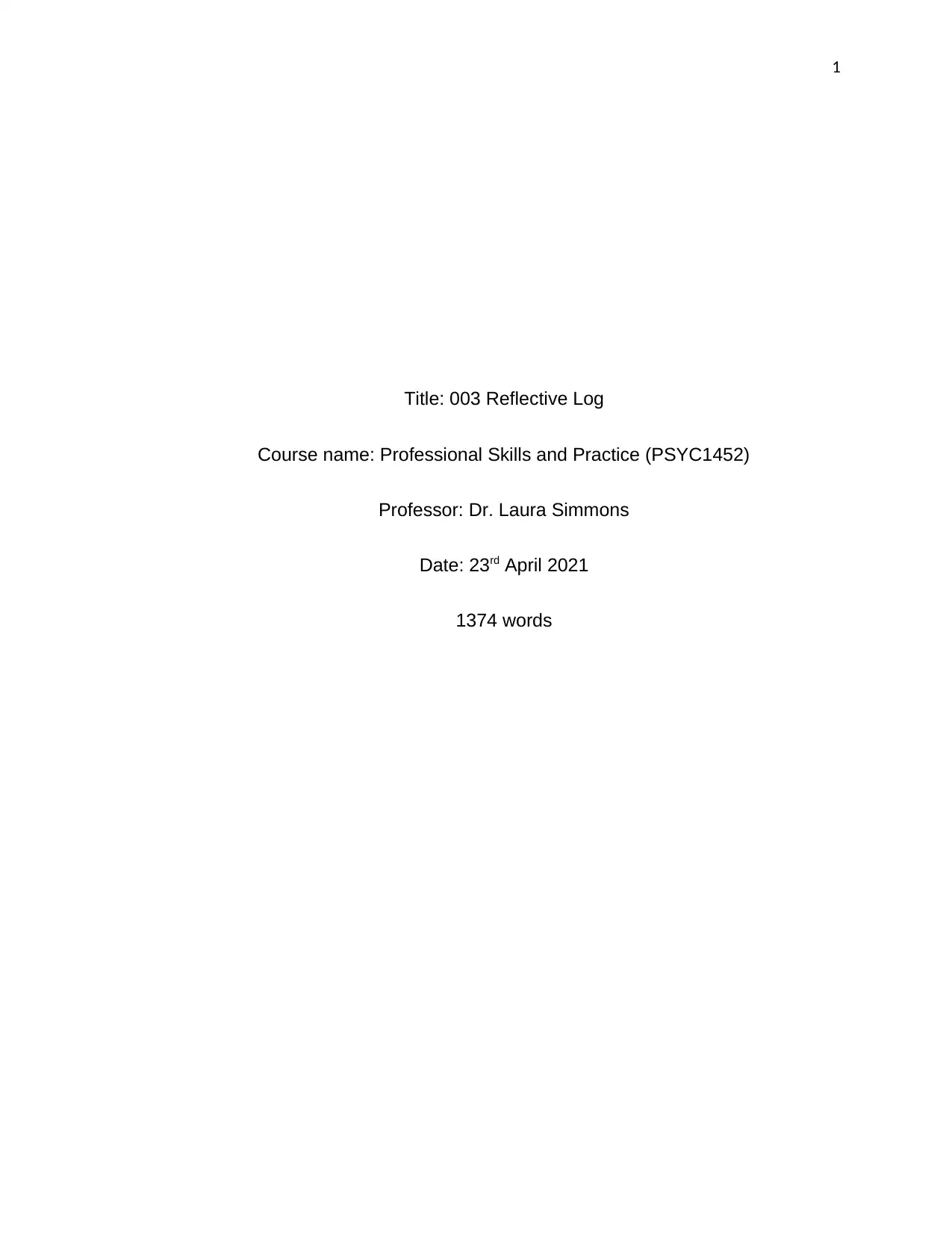
1
Title: 003 Reflective Log
Course name: Professional Skills and Practice (PSYC1452)
Professor: Dr. Laura Simmons
Date: 23rd April 2021
1374 words
Title: 003 Reflective Log
Course name: Professional Skills and Practice (PSYC1452)
Professor: Dr. Laura Simmons
Date: 23rd April 2021
1374 words
Secure Best Marks with AI Grader
Need help grading? Try our AI Grader for instant feedback on your assignments.
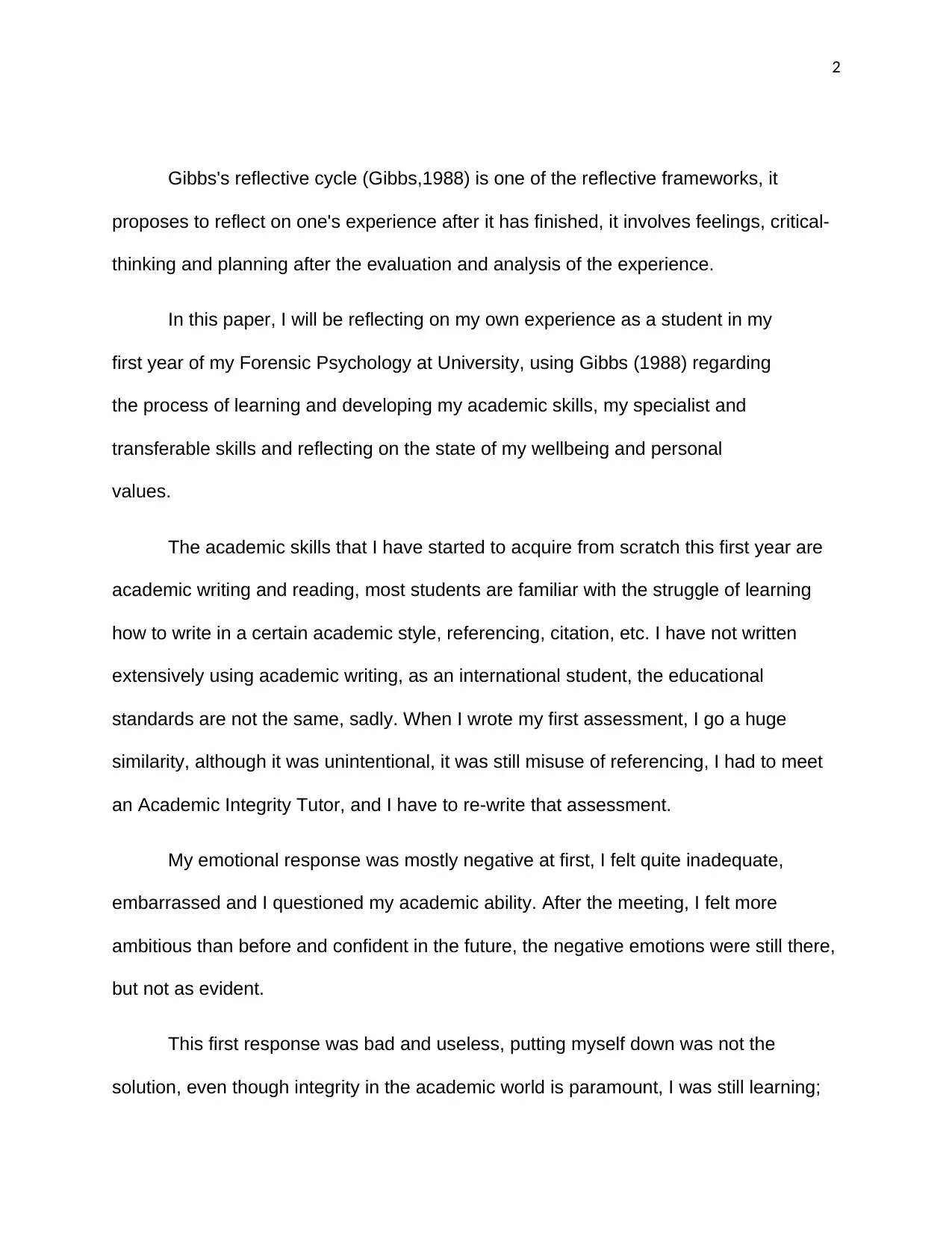
2
Gibbs's reflective cycle (Gibbs,1988) is one of the reflective frameworks, it
proposes to reflect on one's experience after it has finished, it involves feelings, critical-
thinking and planning after the evaluation and analysis of the experience.
In this paper, I will be reflecting on my own experience as a student in my
first year of my Forensic Psychology at University, using Gibbs (1988) regarding
the process of learning and developing my academic skills, my specialist and
transferable skills and reflecting on the state of my wellbeing and personal
values.
The academic skills that I have started to acquire from scratch this first year are
academic writing and reading, most students are familiar with the struggle of learning
how to write in a certain academic style, referencing, citation, etc. I have not written
extensively using academic writing, as an international student, the educational
standards are not the same, sadly. When I wrote my first assessment, I go a huge
similarity, although it was unintentional, it was still misuse of referencing, I had to meet
an Academic Integrity Tutor, and I have to re-write that assessment.
My emotional response was mostly negative at first, I felt quite inadequate,
embarrassed and I questioned my academic ability. After the meeting, I felt more
ambitious than before and confident in the future, the negative emotions were still there,
but not as evident.
This first response was bad and useless, putting myself down was not the
solution, even though integrity in the academic world is paramount, I was still learning;
Gibbs's reflective cycle (Gibbs,1988) is one of the reflective frameworks, it
proposes to reflect on one's experience after it has finished, it involves feelings, critical-
thinking and planning after the evaluation and analysis of the experience.
In this paper, I will be reflecting on my own experience as a student in my
first year of my Forensic Psychology at University, using Gibbs (1988) regarding
the process of learning and developing my academic skills, my specialist and
transferable skills and reflecting on the state of my wellbeing and personal
values.
The academic skills that I have started to acquire from scratch this first year are
academic writing and reading, most students are familiar with the struggle of learning
how to write in a certain academic style, referencing, citation, etc. I have not written
extensively using academic writing, as an international student, the educational
standards are not the same, sadly. When I wrote my first assessment, I go a huge
similarity, although it was unintentional, it was still misuse of referencing, I had to meet
an Academic Integrity Tutor, and I have to re-write that assessment.
My emotional response was mostly negative at first, I felt quite inadequate,
embarrassed and I questioned my academic ability. After the meeting, I felt more
ambitious than before and confident in the future, the negative emotions were still there,
but not as evident.
This first response was bad and useless, putting myself down was not the
solution, even though integrity in the academic world is paramount, I was still learning;
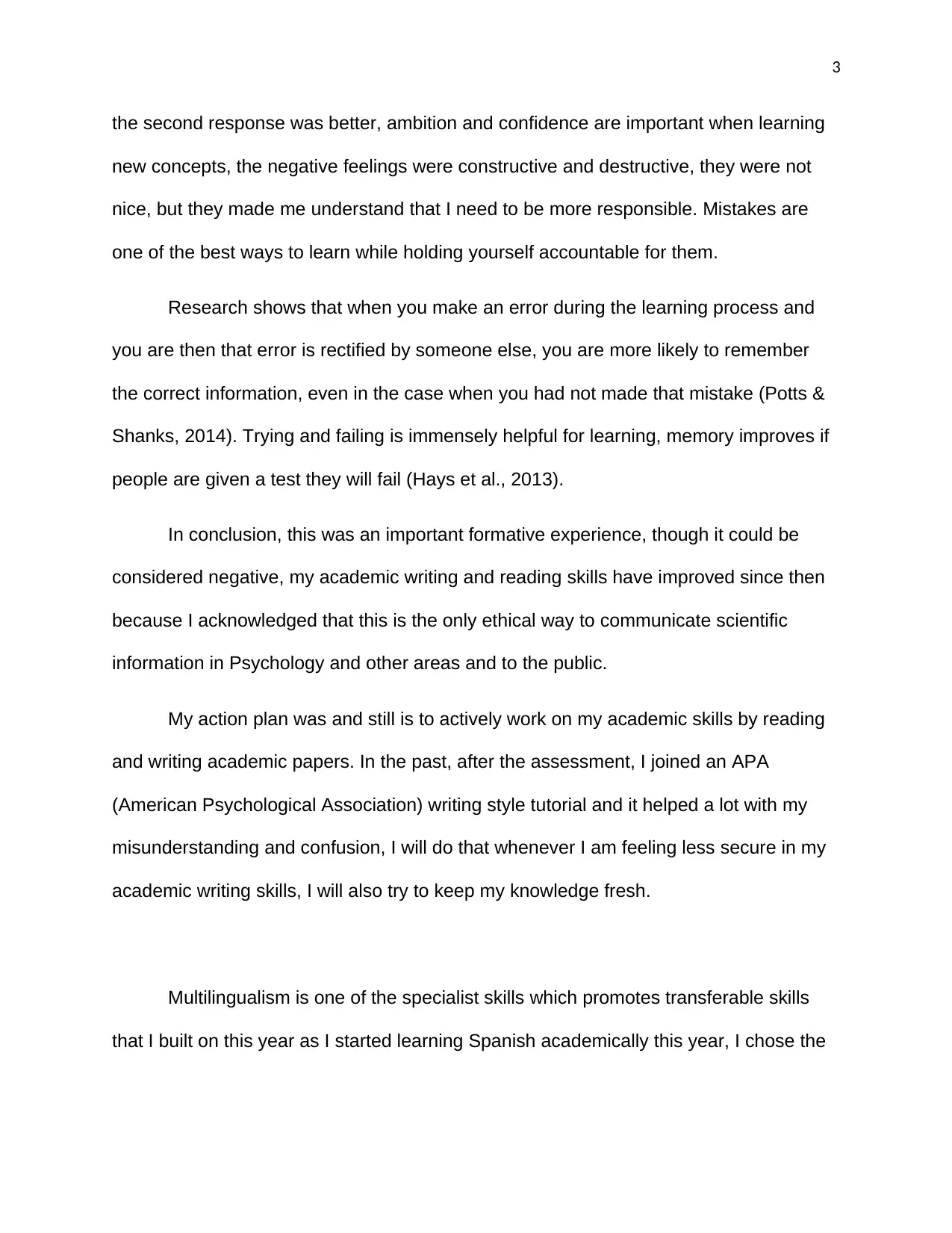
3
the second response was better, ambition and confidence are important when learning
new concepts, the negative feelings were constructive and destructive, they were not
nice, but they made me understand that I need to be more responsible. Mistakes are
one of the best ways to learn while holding yourself accountable for them.
Research shows that when you make an error during the learning process and
you are then that error is rectified by someone else, you are more likely to remember
the correct information, even in the case when you had not made that mistake (Potts &
Shanks, 2014). Trying and failing is immensely helpful for learning, memory improves if
people are given a test they will fail (Hays et al., 2013).
In conclusion, this was an important formative experience, though it could be
considered negative, my academic writing and reading skills have improved since then
because I acknowledged that this is the only ethical way to communicate scientific
information in Psychology and other areas and to the public.
My action plan was and still is to actively work on my academic skills by reading
and writing academic papers. In the past, after the assessment, I joined an APA
(American Psychological Association) writing style tutorial and it helped a lot with my
misunderstanding and confusion, I will do that whenever I am feeling less secure in my
academic writing skills, I will also try to keep my knowledge fresh.
Multilingualism is one of the specialist skills which promotes transferable skills
that I built on this year as I started learning Spanish academically this year, I chose the
the second response was better, ambition and confidence are important when learning
new concepts, the negative feelings were constructive and destructive, they were not
nice, but they made me understand that I need to be more responsible. Mistakes are
one of the best ways to learn while holding yourself accountable for them.
Research shows that when you make an error during the learning process and
you are then that error is rectified by someone else, you are more likely to remember
the correct information, even in the case when you had not made that mistake (Potts &
Shanks, 2014). Trying and failing is immensely helpful for learning, memory improves if
people are given a test they will fail (Hays et al., 2013).
In conclusion, this was an important formative experience, though it could be
considered negative, my academic writing and reading skills have improved since then
because I acknowledged that this is the only ethical way to communicate scientific
information in Psychology and other areas and to the public.
My action plan was and still is to actively work on my academic skills by reading
and writing academic papers. In the past, after the assessment, I joined an APA
(American Psychological Association) writing style tutorial and it helped a lot with my
misunderstanding and confusion, I will do that whenever I am feeling less secure in my
academic writing skills, I will also try to keep my knowledge fresh.
Multilingualism is one of the specialist skills which promotes transferable skills
that I built on this year as I started learning Spanish academically this year, I chose the
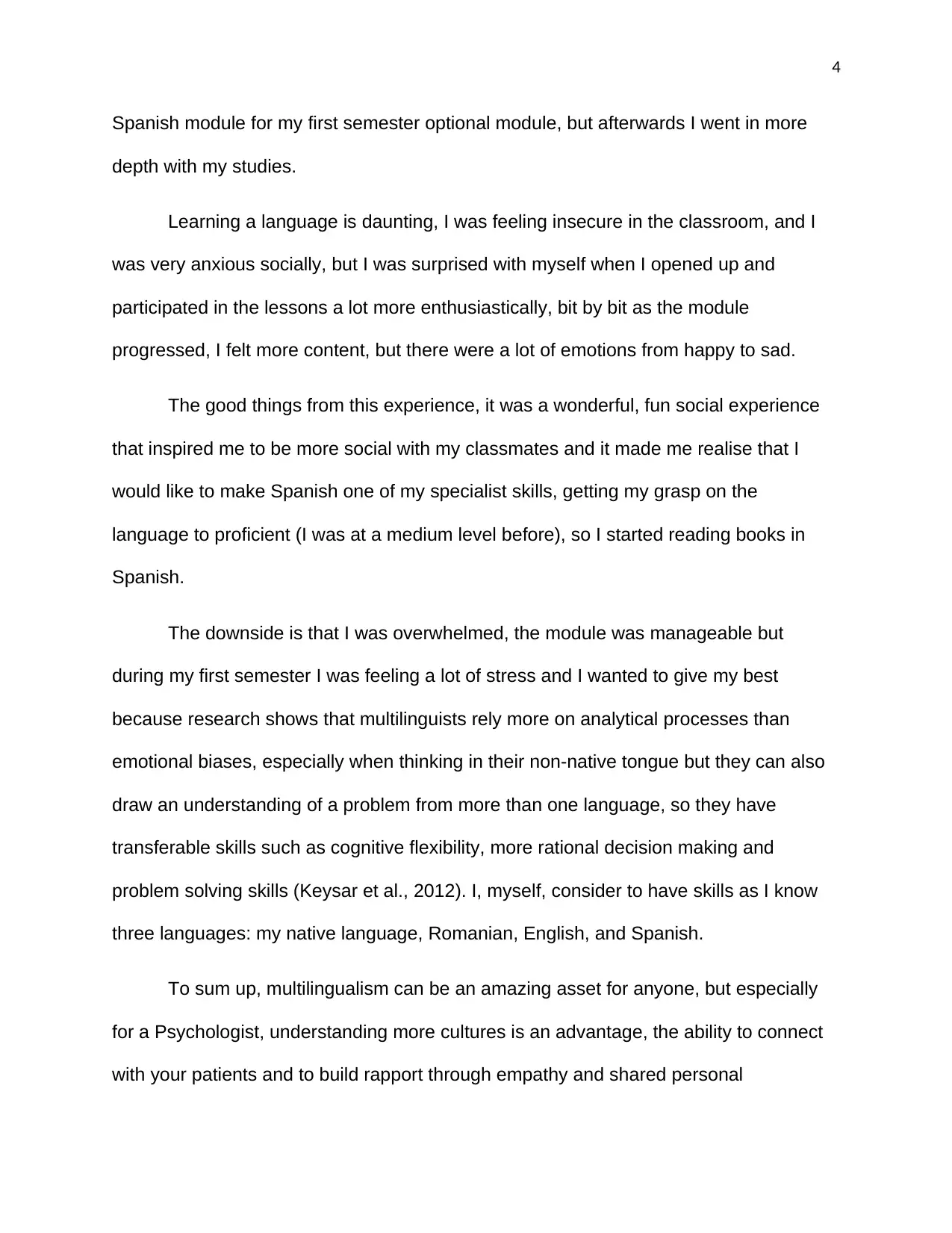
4
Spanish module for my first semester optional module, but afterwards I went in more
depth with my studies.
Learning a language is daunting, I was feeling insecure in the classroom, and I
was very anxious socially, but I was surprised with myself when I opened up and
participated in the lessons a lot more enthusiastically, bit by bit as the module
progressed, I felt more content, but there were a lot of emotions from happy to sad.
The good things from this experience, it was a wonderful, fun social experience
that inspired me to be more social with my classmates and it made me realise that I
would like to make Spanish one of my specialist skills, getting my grasp on the
language to proficient (I was at a medium level before), so I started reading books in
Spanish.
The downside is that I was overwhelmed, the module was manageable but
during my first semester I was feeling a lot of stress and I wanted to give my best
because research shows that multilinguists rely more on analytical processes than
emotional biases, especially when thinking in their non-native tongue but they can also
draw an understanding of a problem from more than one language, so they have
transferable skills such as cognitive flexibility, more rational decision making and
problem solving skills (Keysar et al., 2012). I, myself, consider to have skills as I know
three languages: my native language, Romanian, English, and Spanish.
To sum up, multilingualism can be an amazing asset for anyone, but especially
for a Psychologist, understanding more cultures is an advantage, the ability to connect
with your patients and to build rapport through empathy and shared personal
Spanish module for my first semester optional module, but afterwards I went in more
depth with my studies.
Learning a language is daunting, I was feeling insecure in the classroom, and I
was very anxious socially, but I was surprised with myself when I opened up and
participated in the lessons a lot more enthusiastically, bit by bit as the module
progressed, I felt more content, but there were a lot of emotions from happy to sad.
The good things from this experience, it was a wonderful, fun social experience
that inspired me to be more social with my classmates and it made me realise that I
would like to make Spanish one of my specialist skills, getting my grasp on the
language to proficient (I was at a medium level before), so I started reading books in
Spanish.
The downside is that I was overwhelmed, the module was manageable but
during my first semester I was feeling a lot of stress and I wanted to give my best
because research shows that multilinguists rely more on analytical processes than
emotional biases, especially when thinking in their non-native tongue but they can also
draw an understanding of a problem from more than one language, so they have
transferable skills such as cognitive flexibility, more rational decision making and
problem solving skills (Keysar et al., 2012). I, myself, consider to have skills as I know
three languages: my native language, Romanian, English, and Spanish.
To sum up, multilingualism can be an amazing asset for anyone, but especially
for a Psychologist, understanding more cultures is an advantage, the ability to connect
with your patients and to build rapport through empathy and shared personal
Secure Best Marks with AI Grader
Need help grading? Try our AI Grader for instant feedback on your assignments.
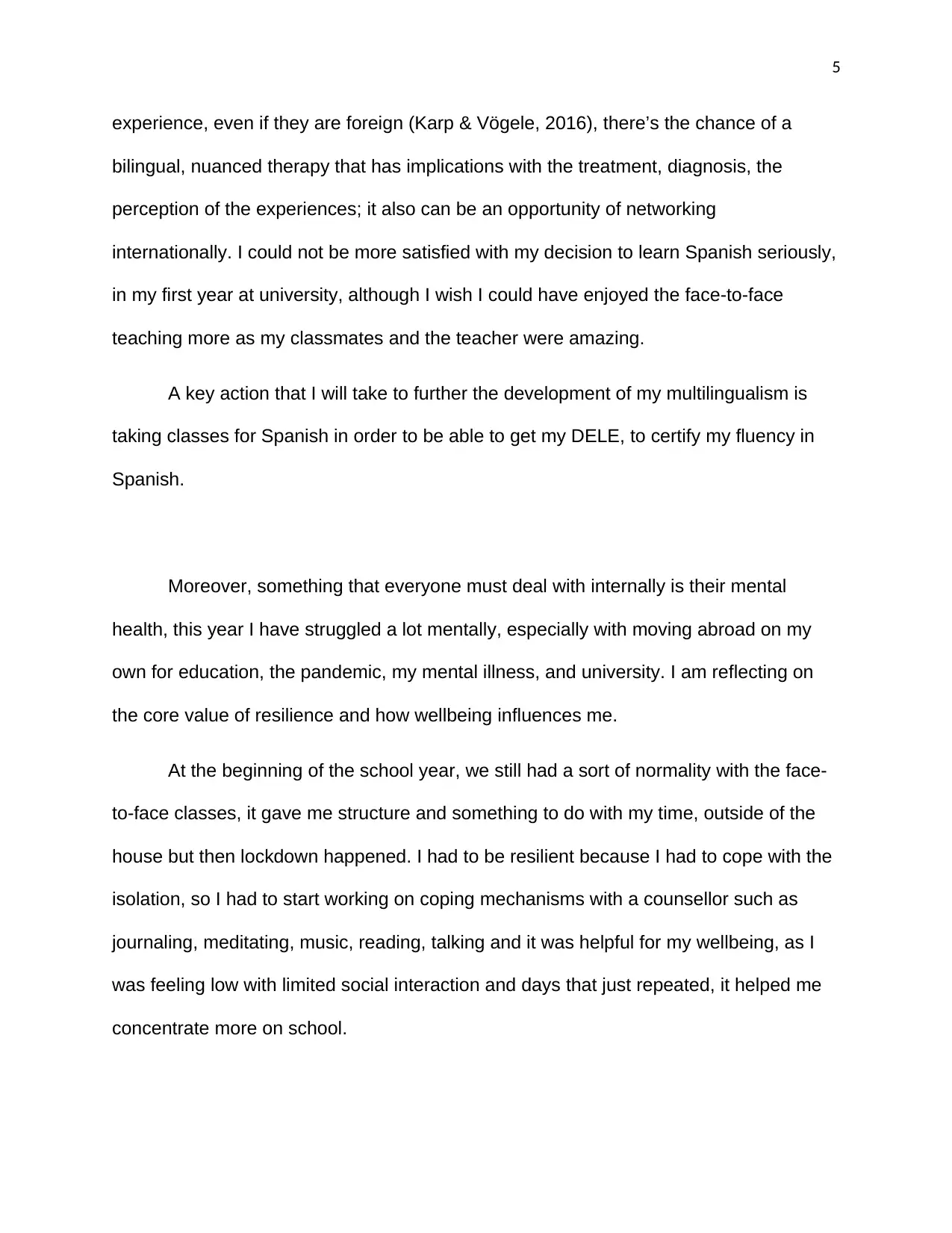
5
experience, even if they are foreign (Karp & Vögele, 2016), there’s the chance of a
bilingual, nuanced therapy that has implications with the treatment, diagnosis, the
perception of the experiences; it also can be an opportunity of networking
internationally. I could not be more satisfied with my decision to learn Spanish seriously,
in my first year at university, although I wish I could have enjoyed the face-to-face
teaching more as my classmates and the teacher were amazing.
A key action that I will take to further the development of my multilingualism is
taking classes for Spanish in order to be able to get my DELE, to certify my fluency in
Spanish.
Moreover, something that everyone must deal with internally is their mental
health, this year I have struggled a lot mentally, especially with moving abroad on my
own for education, the pandemic, my mental illness, and university. I am reflecting on
the core value of resilience and how wellbeing influences me.
At the beginning of the school year, we still had a sort of normality with the face-
to-face classes, it gave me structure and something to do with my time, outside of the
house but then lockdown happened. I had to be resilient because I had to cope with the
isolation, so I had to start working on coping mechanisms with a counsellor such as
journaling, meditating, music, reading, talking and it was helpful for my wellbeing, as I
was feeling low with limited social interaction and days that just repeated, it helped me
concentrate more on school.
experience, even if they are foreign (Karp & Vögele, 2016), there’s the chance of a
bilingual, nuanced therapy that has implications with the treatment, diagnosis, the
perception of the experiences; it also can be an opportunity of networking
internationally. I could not be more satisfied with my decision to learn Spanish seriously,
in my first year at university, although I wish I could have enjoyed the face-to-face
teaching more as my classmates and the teacher were amazing.
A key action that I will take to further the development of my multilingualism is
taking classes for Spanish in order to be able to get my DELE, to certify my fluency in
Spanish.
Moreover, something that everyone must deal with internally is their mental
health, this year I have struggled a lot mentally, especially with moving abroad on my
own for education, the pandemic, my mental illness, and university. I am reflecting on
the core value of resilience and how wellbeing influences me.
At the beginning of the school year, we still had a sort of normality with the face-
to-face classes, it gave me structure and something to do with my time, outside of the
house but then lockdown happened. I had to be resilient because I had to cope with the
isolation, so I had to start working on coping mechanisms with a counsellor such as
journaling, meditating, music, reading, talking and it was helpful for my wellbeing, as I
was feeling low with limited social interaction and days that just repeated, it helped me
concentrate more on school.
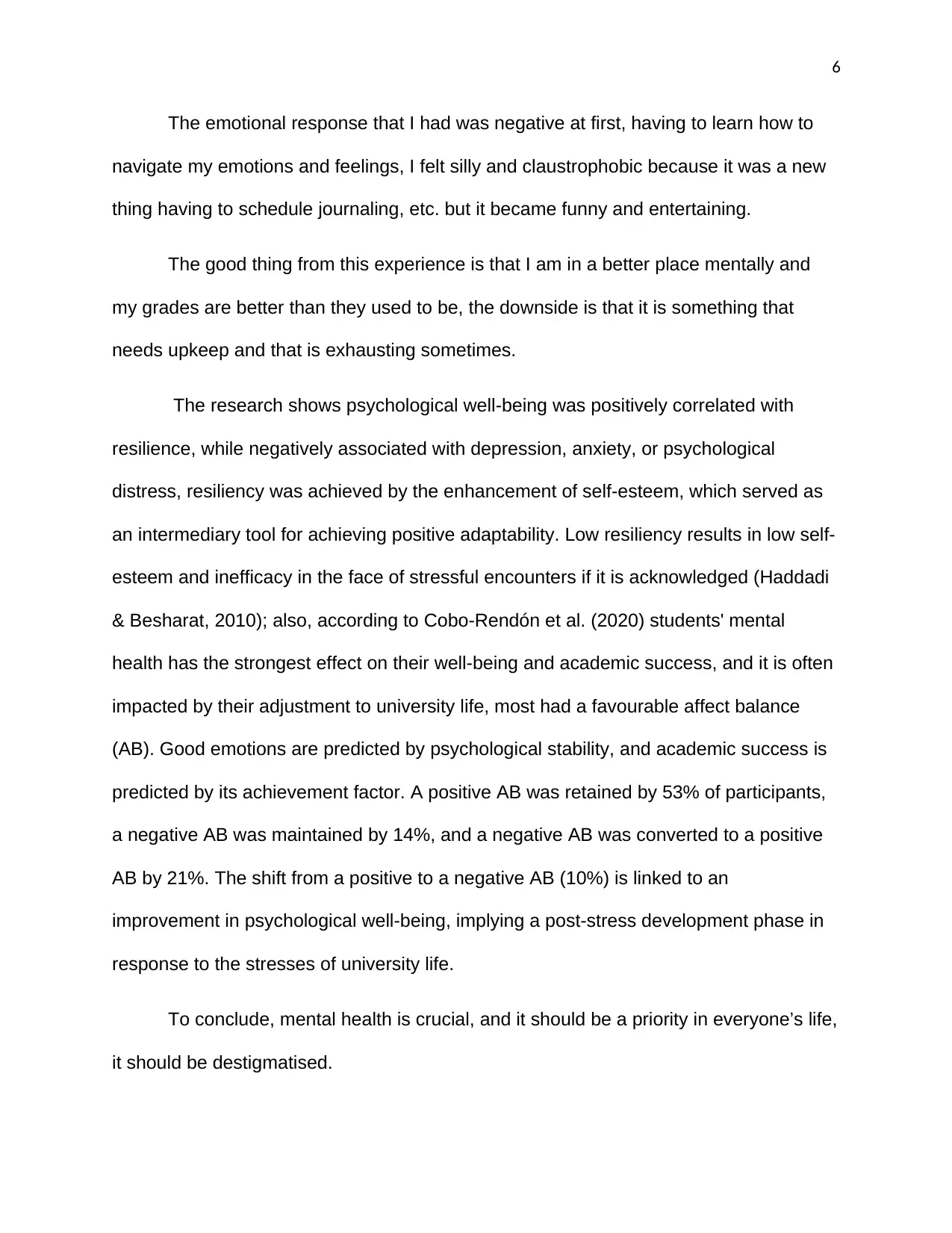
6
The emotional response that I had was negative at first, having to learn how to
navigate my emotions and feelings, I felt silly and claustrophobic because it was a new
thing having to schedule journaling, etc. but it became funny and entertaining.
The good thing from this experience is that I am in a better place mentally and
my grades are better than they used to be, the downside is that it is something that
needs upkeep and that is exhausting sometimes.
The research shows psychological well-being was positively correlated with
resilience, while negatively associated with depression, anxiety, or psychological
distress, resiliency was achieved by the enhancement of self-esteem, which served as
an intermediary tool for achieving positive adaptability. Low resiliency results in low self-
esteem and inefficacy in the face of stressful encounters if it is acknowledged (Haddadi
& Besharat, 2010); also, according to Cobo‐Rendón et al. (2020) students' mental
health has the strongest effect on their well-being and academic success, and it is often
impacted by their adjustment to university life, most had a favourable affect balance
(AB). Good emotions are predicted by psychological stability, and academic success is
predicted by its achievement factor. A positive AB was retained by 53% of participants,
a negative AB was maintained by 14%, and a negative AB was converted to a positive
AB by 21%. The shift from a positive to a negative AB (10%) is linked to an
improvement in psychological well-being, implying a post-stress development phase in
response to the stresses of university life.
To conclude, mental health is crucial, and it should be a priority in everyone’s life,
it should be destigmatised.
The emotional response that I had was negative at first, having to learn how to
navigate my emotions and feelings, I felt silly and claustrophobic because it was a new
thing having to schedule journaling, etc. but it became funny and entertaining.
The good thing from this experience is that I am in a better place mentally and
my grades are better than they used to be, the downside is that it is something that
needs upkeep and that is exhausting sometimes.
The research shows psychological well-being was positively correlated with
resilience, while negatively associated with depression, anxiety, or psychological
distress, resiliency was achieved by the enhancement of self-esteem, which served as
an intermediary tool for achieving positive adaptability. Low resiliency results in low self-
esteem and inefficacy in the face of stressful encounters if it is acknowledged (Haddadi
& Besharat, 2010); also, according to Cobo‐Rendón et al. (2020) students' mental
health has the strongest effect on their well-being and academic success, and it is often
impacted by their adjustment to university life, most had a favourable affect balance
(AB). Good emotions are predicted by psychological stability, and academic success is
predicted by its achievement factor. A positive AB was retained by 53% of participants,
a negative AB was maintained by 14%, and a negative AB was converted to a positive
AB by 21%. The shift from a positive to a negative AB (10%) is linked to an
improvement in psychological well-being, implying a post-stress development phase in
response to the stresses of university life.
To conclude, mental health is crucial, and it should be a priority in everyone’s life,
it should be destigmatised.
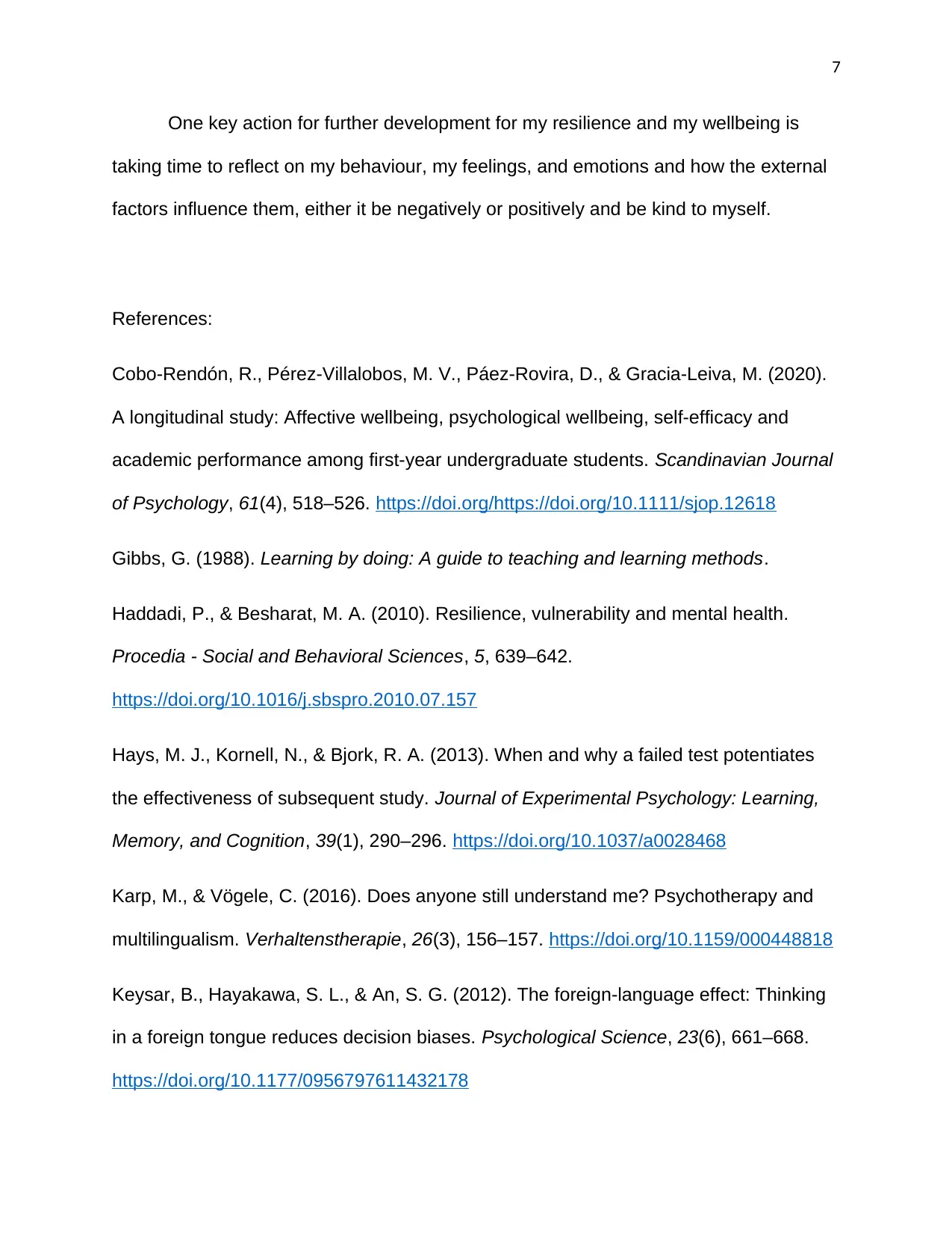
7
One key action for further development for my resilience and my wellbeing is
taking time to reflect on my behaviour, my feelings, and emotions and how the external
factors influence them, either it be negatively or positively and be kind to myself.
References:
Cobo‐Rendón, R., Pérez‐Villalobos, M. V., Páez‐Rovira, D., & Gracia‐Leiva, M. (2020).
A longitudinal study: Affective wellbeing, psychological wellbeing, self-efficacy and
academic performance among first-year undergraduate students. Scandinavian Journal
of Psychology, 61(4), 518–526. https://doi.org/https://doi.org/10.1111/sjop.12618
Gibbs, G. (1988). Learning by doing: A guide to teaching and learning methods.
Haddadi, P., & Besharat, M. A. (2010). Resilience, vulnerability and mental health.
Procedia - Social and Behavioral Sciences, 5, 639–642.
https://doi.org/10.1016/j.sbspro.2010.07.157
Hays, M. J., Kornell, N., & Bjork, R. A. (2013). When and why a failed test potentiates
the effectiveness of subsequent study. Journal of Experimental Psychology: Learning,
Memory, and Cognition, 39(1), 290–296. https://doi.org/10.1037/a0028468
Karp, M., & Vögele, C. (2016). Does anyone still understand me? Psychotherapy and
multilingualism. Verhaltenstherapie, 26(3), 156–157. https://doi.org/10.1159/000448818
Keysar, B., Hayakawa, S. L., & An, S. G. (2012). The foreign-language effect: Thinking
in a foreign tongue reduces decision biases. Psychological Science, 23(6), 661–668.
https://doi.org/10.1177/0956797611432178
One key action for further development for my resilience and my wellbeing is
taking time to reflect on my behaviour, my feelings, and emotions and how the external
factors influence them, either it be negatively or positively and be kind to myself.
References:
Cobo‐Rendón, R., Pérez‐Villalobos, M. V., Páez‐Rovira, D., & Gracia‐Leiva, M. (2020).
A longitudinal study: Affective wellbeing, psychological wellbeing, self-efficacy and
academic performance among first-year undergraduate students. Scandinavian Journal
of Psychology, 61(4), 518–526. https://doi.org/https://doi.org/10.1111/sjop.12618
Gibbs, G. (1988). Learning by doing: A guide to teaching and learning methods.
Haddadi, P., & Besharat, M. A. (2010). Resilience, vulnerability and mental health.
Procedia - Social and Behavioral Sciences, 5, 639–642.
https://doi.org/10.1016/j.sbspro.2010.07.157
Hays, M. J., Kornell, N., & Bjork, R. A. (2013). When and why a failed test potentiates
the effectiveness of subsequent study. Journal of Experimental Psychology: Learning,
Memory, and Cognition, 39(1), 290–296. https://doi.org/10.1037/a0028468
Karp, M., & Vögele, C. (2016). Does anyone still understand me? Psychotherapy and
multilingualism. Verhaltenstherapie, 26(3), 156–157. https://doi.org/10.1159/000448818
Keysar, B., Hayakawa, S. L., & An, S. G. (2012). The foreign-language effect: Thinking
in a foreign tongue reduces decision biases. Psychological Science, 23(6), 661–668.
https://doi.org/10.1177/0956797611432178
Paraphrase This Document
Need a fresh take? Get an instant paraphrase of this document with our AI Paraphraser
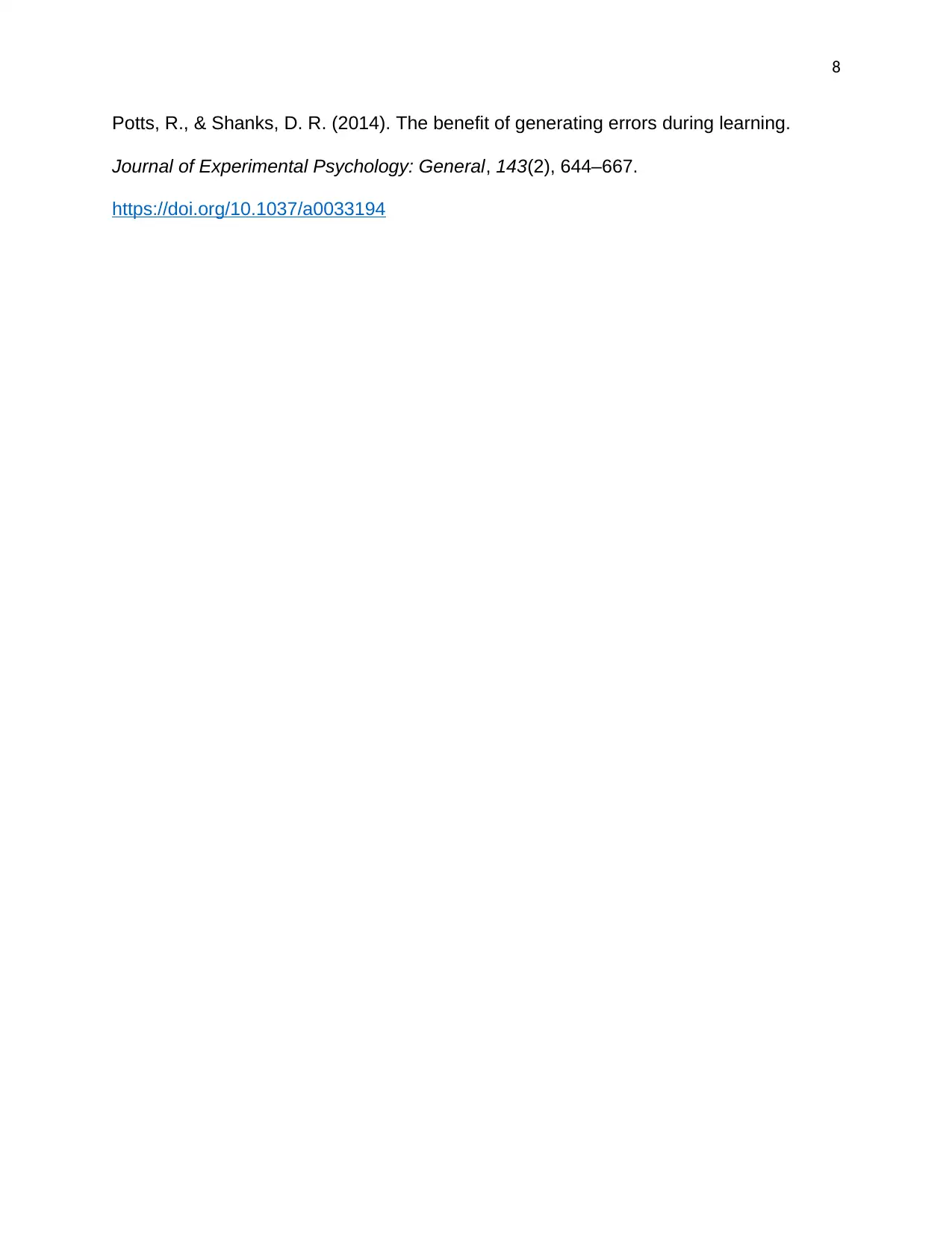
8
Potts, R., & Shanks, D. R. (2014). The benefit of generating errors during learning.
Journal of Experimental Psychology: General, 143(2), 644–667.
https://doi.org/10.1037/a0033194
Potts, R., & Shanks, D. R. (2014). The benefit of generating errors during learning.
Journal of Experimental Psychology: General, 143(2), 644–667.
https://doi.org/10.1037/a0033194
1 out of 8
Your All-in-One AI-Powered Toolkit for Academic Success.
+13062052269
info@desklib.com
Available 24*7 on WhatsApp / Email
![[object Object]](/_next/static/media/star-bottom.7253800d.svg)
Unlock your academic potential
© 2024 | Zucol Services PVT LTD | All rights reserved.





